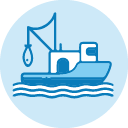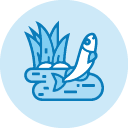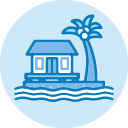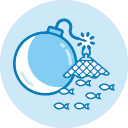
BACTERIAL DIVERSITY OF THE DEEP SEA OF SANGIHE TALAUD, SULAWESI
Deep sea is an extreme environment characterized by cold temperature, high pressure, lack of light and nutrients. Microorganisms live in these habitat are unique microorganisms and known to have tremendous source of potential agents for biotechnology processes. Indonesia as an archipelagic country has a vast deep ocean. This study aims to see the diversity of bacteria in Sangihe Talaud Deep Sea, Sulawesi. Analysis of bacterial diversity was carried out by cultured and uncultured method. Terminal Restriction Fragment Length Polymorphism (T-RFLP) technique was used for uncultured analysis of the microorganisms biodiversity, while cultured one was done by plating the samples of water onto Zobell media. The results showed that, there were 21 isolates obtained by cultured method. The identification which based on 16S rDNA by PCR method showed the genus of Pseudomonas, Pseudoalteromonas, Alteromonas, Vibrio, Shewanella and Uncultured bacterium were identified. However, 14 classes of bacteria were obtained by using TRFLP method i.e Acetobacteraceae class, Actinobacteria, α-proteobacteria, -proteobacteria, δ- proteobacteria, γ-proteobacteria, Bacili, Bacteroidetes, Chlorobi, Chroococcales, Clostridia, Erysipelotrichi, Synergistia, and Zetaproteobacteria. There were also unclassified bacteria and uncultured bacterium found in the samples.
Availability
| B1707230 | Koleksi Digital | Archivelago Indonesia Marine Library - Perpustakaan Kementerian Kelautan dan Perikanan | Available |
Detail Information
- Series Title
-
-
- Call Number
-
Koleksi Digital
- Publisher
- : Research and Development center for marine and fisheries product processing and biotechnology, resea., 2012
- Collation
-
-
- Language
-
English
- ISBN/ISSN
-
-
- Classification
-
NONE
- Content Type
-
-
- Media Type
-
-
- Carrier Type
-
-
- Edition
-
-
- Subject(s)
- Specific Detail Info
-
-
- Statement of Responsibility
-
-
Other version/related
No other version available
File Attachment
Comments
You must be logged in to post a comment
 Perikanan Tangkap
Perikanan Tangkap  Perikanan Budidaya
Perikanan Budidaya  Pengolahan Ikan
Pengolahan Ikan  Pulau Kecil
Pulau Kecil  Masyarakat Pesisir
Masyarakat Pesisir  Local Content
Local Content  Ekspor Perikanan
Ekspor Perikanan  Illegal Fishing
Illegal Fishing  Ilmu - Ilmu Sosial
Ilmu - Ilmu Sosial  Geografi dan Sejarah
Geografi dan Sejarah